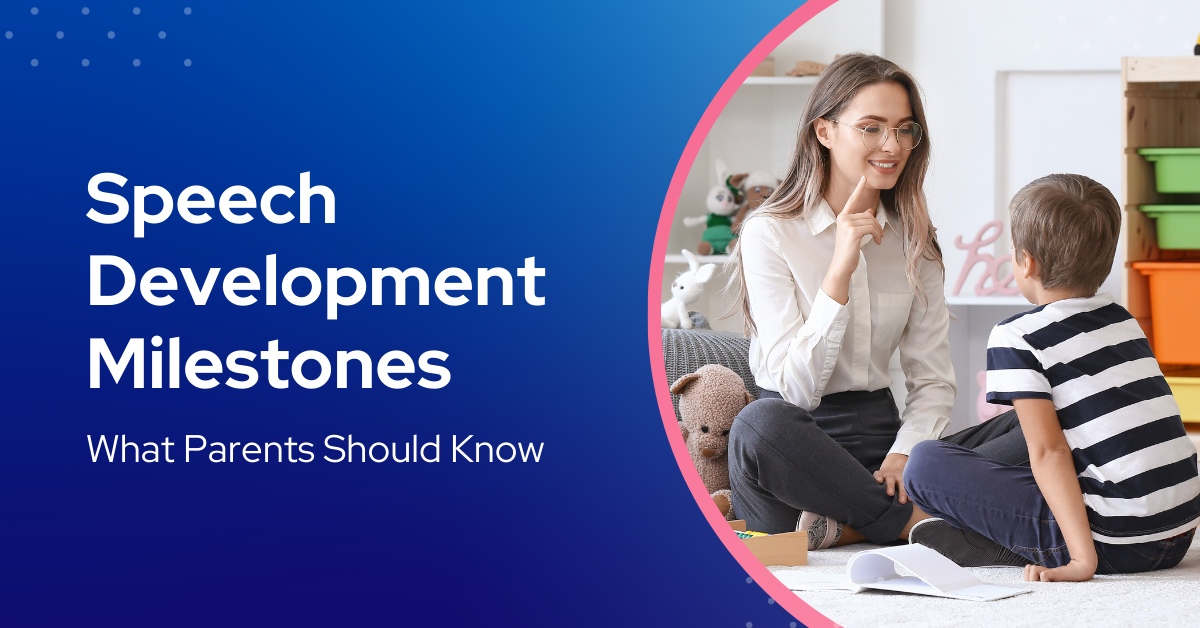One of the most rewarding parts of parenthood is watching your child grow and seeing them learn new skills everyday. With the many areas of development, speech and language skills are one of the most important as it will form the foundation for their communication, social interaction, and learning for the rest of their life. By understanding these milestones, you can help support your child and identify any possible concerns and seek intervention or support early on.
While every child grows and develops at their own pace, being aware of these milestones can help guide you to better understand your child and their development. Remember to try not to compare your child to others around them, some children may talk later in the toddler years based on a number of factors.
Milestones by Age
0-3 Months
- Cooing and Gurgling: In the first few months, babies communicate through coos, gurgles, and cries. You may notice differences in their cry pattern for different needs (ex. hungry cry vs. wet diaper cry)
- Social Smiles: Around six weeks, your baby may start smiling at you and other people.
4-6 Months
- Babbling: By four months, most babies start to babble, producing sounds like "ba", “mi” or "pa" This is a critical stage where they practice the sounds needed for speech.
- Responsive Sounds: Your baby may respond to your voice with sounds, indicating they are engaging in early forms of conversation.
7-12 Months
- Imitation: As your baby approaches their first birthday, they will begin imitating sounds and words. They may also understand simple words like “no” or “bye-bye.”
- Conversing: Your baby may use different sounds and noises to get and keep your attention.
- First Words: Says 1 or 2 words, like hi, dog, dada, mama, or uh-oh. This will happen around their first birthday, but sounds may not be clear.
1-2 Years
- Expanding Vocabulary: By 18 months, many children can say 10-25 words. By age two, they may have a vocabulary of around 50 words and start combining words into simple phrases like “more juice.”
- Understanding Simple Instructions: They can follow simple commands, such as “come here” or “give me the ball.”
- Recognition: Can point to pictures in books and say what it is like, “yellow duck”, “brown bear”, etc.
2-3 Years
- Two- to Three-Word Phrases: By age three, children typically form two- to three-word sentences and can be understood by familiar adults.
- Question Formation: They begin to ask questions about things not in the room, meaning they are remembering things from before.
3-4 Years
- Expanded Vocabulary: A child’s vocabulary may grow to 1,000 words or more. They are able to use descriptive words and can articulate their thoughts more clearly.
- Storytelling: Children can recount simple stories, demonstrating their understanding of sequence and narrative.
4-5 Years
- Conversational Skills: By age five, children can engage in back-and-forth conversations, understand jokes, and use more complex sentences.
- Pronunciation: Most children can pronounce most sounds correctly, although some sounds may still be challenging.
*Milestones mentioned above are according to the AAP (American Academy of Pediatrics)
How to Support Your Child's Speech Development
As a parent, there are many ways you can encourage your child’s speech and language skills:
- Talk to Your Child: Engage in conversations, even when they’re very young. Narrate your daily activities and describe what you see around you. From the day they come home from the hospital, pretend you are a sports broadcaster and narrate everything you are doing. “Mommy is changing your diaper”, “Let’s go get some food”, etc.
- Read Together: Reading age-appropriate books helps vocabulary growth and understanding. Encourage your child to ask questions about the story and also ask questions to ensure they are understanding as well.
- Encourage Play: Playtime provides opportunities for social interaction and communication. Encourage pretend play, which can help their storytelling and vocabulary. You can ask your child, “What do you think your two dinosaurs are talking about?” and watch as they create a conversation between the two.
- Limit Screen Time: While educational programs can be beneficial, interactive communication is essential for developing speech skills. If you are using screen time, make sure it is interactive - you should hear your child answering questions like, “Who is hiding in the barn?” the child responds, “The cow!”
- Be Patient: Every child develops at their own pace. Celebrate their progress, no matter how small and try your best not to compare. All children will get there eventually if they have the right support and encouragement.
When to Seek Help
While there is a lot of wiggle room when it comes to speech development in young kids, it’s important to monitor your child’s progress. Contact a pediatrician or speech-language pathologist if you notice:
- Limited vocalization by 12 months.
- Lack of first words by 15 months.
- Inability to follow simple commands by 18 months.
- Difficulty being understood by 3 years.
- Limited vocabulary or sentence structure by age 4.
By understanding your child’s speech development milestones, you can help as a parent to nurture your child's communication and progress their skills. Actively engaging in their speech and language journey, you’ll provide the support they need to thrive! Remember, every child is unique, and celebrating their individual progress is the key. You know your child better than anyone, so don’t be afraid to ask for help if you need it by reaching out to a professional.

Share:
5 Fun Activities to Help Your Child Practice Speech Skills at Home
Tips for Adjusting to a Mouth Device (Like Spot Pal)